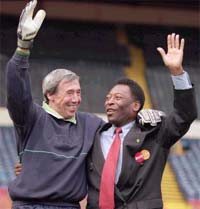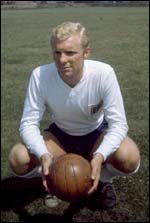Brazil's last World Cup match against England in the Mexican City of Guadalajara in 1970 is always remembered as a classic, but it also created images that have remained in the national psyche of both countries.
Gordon Banks's save from Pele's header, Jairzinho's goal beautifully set up by Tostao, Jeff Astle firing wide with only goalkeeper Felix to beat. Bobby Moore's perfectly-timed tackle on Jairzinho. Plus, who could forget Moore and Pele swapping shirts at the final whistle?
For some of the players it was the peak of their careers, for others a game they would always be associated with even if, in Astle's case, the memories were anything but fond ones.
Pele is, of course, the most famous of those present and went on to help Brazil keep the Jules Rimet trophy after winning it for a record third time against Italy in a memorable final during which he scored his country's 100th World Cup goal with a header.
Tarcisio Burgnich, the Italy defender marking Pele in the final, later said: "I told myself before the game, 'he's made of skin and bones just like everyone else' -- but I was wrong."
 Pele made the last of his 115 international appearances in 1971 and retired from the game in 1977 after a 21-year career that included 1,285 goals in 1,364 games.
Pele made the last of his 115 international appearances in 1971 and retired from the game in 1977 after a 21-year career that included 1,285 goals in 1,364 games.
Since he retired as a player, Pele, 61, has used his ambassadorial status to promote his country, the United Nations and the U.N. children's fund UNICEF. He was also Brazil's Minister of Sport for four years in the 1990s.
"Every kid in the world who plays football wants to be Pele -- which means I have the responsibility of showing them how to be a footballer but also how to be a man," Pele once said.
WHAT A SAVE
The reason Pele did not score in that 1970 match was mainly down to the reflexes of England goalkeeper Banks.
Jairzinho whipped in a cross from the right and Pele leapt above Tommy Wright at the far post and headed the ball down but Banks seemed to appear from nowhere to scoop it over the bar.
Pele, who was screaming goal as soon as the ball left his head, says: "I still don't know how Banks got across his goal so fast for that miraculous save, I thought I was going to score."
It was Banks's finest save in a career that had begun as a part-timer with Chesterfield in 1955 and taken in a World Cup winners' medal in 1966, but ended with his retirement from the English game in 1972 after a car accident blinded him in the right eye.
Just months earlier he had been voted England's Player of the Year and won the League Cup with Stoke City. He had kept 35 clean sheets for his country and conceded only 57 goals in 73 matches during which time England only lost nine times.
POPULAR SPEAKER
He played for Fort Lauderdale strikers in America and coached at Stoke and Port Vale before managing Telford United. He later ran his own sports promotion agency and became a member of the Pools Panel as well as being a popular after-dinner speaker.
The man who did find a way past Banks, and every other goalkeeper he faced in the 1970 finals, was Jairzinho.
After recovering from a twice-broken right leg, the winger with the knack of hitting the back of the net became the only player to score in every round including the final.
His seven goals were second only to the 10 of West Germany's Gerd Muller, but Jairzinho's were much more artistic and came in various guises from subtle chips to powerful shots.
Jairzinho's winner against England was one of the highlights of the tournament from a player who could set up team mates just as expertly as putting the finishing touches to a move himself.
He played in the 1974 World Cup in West Germany, but without the retired Pele the Brazilians came fourth. Jairzinho went on to play for Marseille, but soon returned to Rio. He won 82 caps, the last when he was a veteran at 38 years old.
Jairzinho may have scored more than once against England but for the attentions of captain Bobby Moore. The West Ham defender was accused of stealing a gold bracelet and put in jail for four days, but the episode did not affect his concentration as Moore timed his tackles to perfection as usual, notably on Jairzinho.
His perfect tackle on Jairzinho is regularly shown on British television as a prime example of how to defend. But he had been doing the same thing for West Ham United for years, bringing him England's Player of the Year award in 1964.
"GREAT SPORTSMAN"
 Moore played the last of his 108 games for England in 1973 at Wembley and retired from English football after three seasons with Fulham. He later played in America for Seattle Sounders, but never succeeded as a manager at Southend and Oxford.
Moore played the last of his 108 games for England in 1973 at Wembley and retired from English football after three seasons with Fulham. He later played in America for Seattle Sounders, but never succeeded as a manager at Southend and Oxford.
He suffered heart problems in 1986 and was struck by cancer in 1991 and died two years later aged just 51.
Pele called him "one of the world's finest defenders and a great sportsman. The shirt he wore against me in that 1970 match is my prize possession. The world has lost one of its greatest football players and a great gentlemen."
The man who would probably have rather forgotten that 1970 showdown was Jeff Astle. The striker was a back-up for Geoff Hurst and did not do his cause any good when he came on just after the hour mark and was promptly guilty of a glaring miss.
But Dave Bowler, writing on the website of Astle's club West Bromwich Albion, says: "Unfairly, Jeff’s World Cup is remembered for what was ultimately an inconsequential miss against Brazil at the group stage, a far harder goalscoring opportunity than it was described at the time. Otherwise Astle looked what he was -- strong, mobile and brilliant in the air."
Astle himself said: "A lot of people talk about that chance against Brazil, but it doesn't worry me, at all. I missed it and that's that. It was difficult because I had just come on and it was my first touch."
Astle later came through two cartilage operations, but he was never the same player and ended his days at the Albion in July 1974. He won five caps and had a number one hit record with the England squad when 'Back Home' topped the charts in 1970.
But his singing was as awful as his miss against Brazil and he found fame for his guest appearances on a programme called Fantasy Football as one of the worst crooners on TV.
At the end of each show Astle, dressed in various guises, would sing as the credits rolled. He died at the age of 59 in January 2000.

